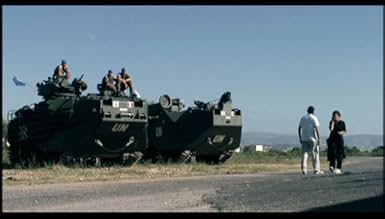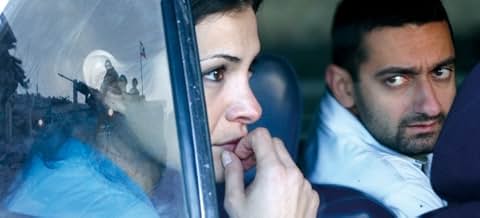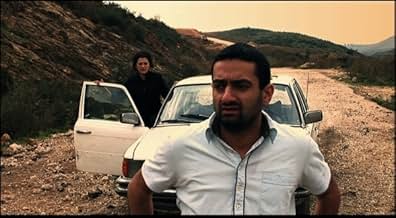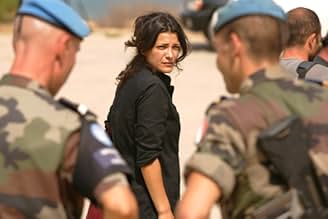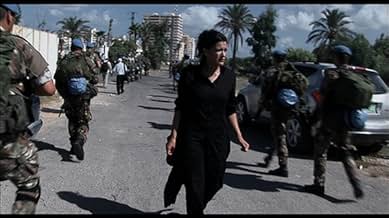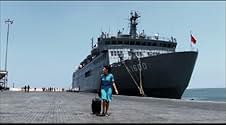PUNTUACIÓN EN IMDb
7,0/10
1,8 mil
TU PUNTUACIÓN
Añade un argumento en tu idiomaIn the wake of Israel's 2006 bombardment of Lebanon, a determined woman finds her way into the country convincing a taxi cab driver to take a risky journey around the scarred region in searc... Leer todoIn the wake of Israel's 2006 bombardment of Lebanon, a determined woman finds her way into the country convincing a taxi cab driver to take a risky journey around the scarred region in search of her sister and her son.In the wake of Israel's 2006 bombardment of Lebanon, a determined woman finds her way into the country convincing a taxi cab driver to take a risky journey around the scarred region in search of her sister and her son.
- Dirección
- Guión
- Reparto principal
- Premios
- 8 premios y 4 nominaciones en total
Reseñas destacadas
Director Aractingi shot this film in the immediate wake of the systematic 34-day Israeli bombing of Lebanon in summer 2006, which left much of the country devastated, especially the South. He uses his own footage of the bombing itself, which shows whole neighborhoods being decimated, and then shoots among the rubble to tell the story of Zaina (Nada Abou Farhat), a divorced mother who comes from Dubai, where she was living with her architect husband, to find Karim, her six-year-old son, who was trapped by the bombing in Kherbet Salam, a Shia Muslim village in southern Lebanon. Zaina left Karim there with her sister, ironically, to "protect" him from the stress of her divorce. The only taxi driver who'll make the dangerous trip is Tony (George Khabbaz), a Christian who turns out to be from the South himself.
Aractingi got the idea of shooting in war devastation with an improvised plot in 1989 as Lebanon's civil war of that time wound down, but fear prevented him from proceeding. Instead he shot 40 documentaries and one feature that used improvisation (the 2005 Bosta) and also starred Nada Abou Farhat. As he got to work with his cast and crew for Under the Bombs, beginning shooting during the bombing and continuing during the ceasefire, he made the decision not to deal with the war so much as its impact on innocent victims, which Zaina and Karim obviously are.
And many of the people and their sufferings are authentic and real-time. When Tony and Zaina reach Kherbet Salam the building her sister lived in is completely destroyed. A young woman comes up and tells her Maha, her sister, is a martyr now. Zaina and Tony go to witness the disinterring of those who died to be reburied in "martyrs' graves," hoping to find the body of Maha (they do not). Aractingi films the actual funerals--not an easy task.
People say Karim was taken up by foreign journalists and went away with them, and this leads Tony and Zaina further south, just a few kilometers from the Israeli border, where they stop over with Tony's Christian family. It emerges that they were collaborators during the long Israeli occupation of south Lebanon and one brother is among those who fled to live in Israel in the aftermath of that time. The confrontation between Tony and his relatives over this collaboration is the fruit of discussions among villagers which Aractingi and his co-writer, Michel Léviant, condensed into a script. This is one example of how the actual fed into the fictional in the day-to-day shooting.
The emotions are powerful and the backgrounds are horrifying in the film. Nothing quite equals the sense of identification when Zaina looks at a whole street where her sister lived and finds only ruins after the systematic bombing destruction. Less successful at times are the interactions between Zaina and Tony, who flirts, comforts, and acts out a surprisingly graphic sex scene with a room clerk at a hotel they stop at on the way. Khabbaz and Abou Farhat are good, but some cutting might have helped eliminate distracting elements. The car's breaking down just before the couple gets to the monastery where Karim is rumored to be seems a rather obvious suspense device too.
The film is neutral as it can be, perhaps to a fault. One wonders why Hezbollah is barely even mentioned, since it is the other party in the warfare, and was the prime provider of aid to the victims in the bombing's immediate aftermath. Though the collaborating family members refer to being "forced to work for the Devil," meaning Israel, the focus is on the suffering rather than its source. Aractingi's film has flaws, but its boldness in bringing to the screen the 2006 bombing of Lebanon and the civilian suffering it caused can't be faulted.
The San Francisco International Film Festival 2008 provided the West Coast premiere of this film, which was scheduled to open less than two weeks later, on May 12, in Paris. This was nominated for the Grand Jury prize at Sundance and received the EIUC Award at Venice.
Aractingi got the idea of shooting in war devastation with an improvised plot in 1989 as Lebanon's civil war of that time wound down, but fear prevented him from proceeding. Instead he shot 40 documentaries and one feature that used improvisation (the 2005 Bosta) and also starred Nada Abou Farhat. As he got to work with his cast and crew for Under the Bombs, beginning shooting during the bombing and continuing during the ceasefire, he made the decision not to deal with the war so much as its impact on innocent victims, which Zaina and Karim obviously are.
And many of the people and their sufferings are authentic and real-time. When Tony and Zaina reach Kherbet Salam the building her sister lived in is completely destroyed. A young woman comes up and tells her Maha, her sister, is a martyr now. Zaina and Tony go to witness the disinterring of those who died to be reburied in "martyrs' graves," hoping to find the body of Maha (they do not). Aractingi films the actual funerals--not an easy task.
People say Karim was taken up by foreign journalists and went away with them, and this leads Tony and Zaina further south, just a few kilometers from the Israeli border, where they stop over with Tony's Christian family. It emerges that they were collaborators during the long Israeli occupation of south Lebanon and one brother is among those who fled to live in Israel in the aftermath of that time. The confrontation between Tony and his relatives over this collaboration is the fruit of discussions among villagers which Aractingi and his co-writer, Michel Léviant, condensed into a script. This is one example of how the actual fed into the fictional in the day-to-day shooting.
The emotions are powerful and the backgrounds are horrifying in the film. Nothing quite equals the sense of identification when Zaina looks at a whole street where her sister lived and finds only ruins after the systematic bombing destruction. Less successful at times are the interactions between Zaina and Tony, who flirts, comforts, and acts out a surprisingly graphic sex scene with a room clerk at a hotel they stop at on the way. Khabbaz and Abou Farhat are good, but some cutting might have helped eliminate distracting elements. The car's breaking down just before the couple gets to the monastery where Karim is rumored to be seems a rather obvious suspense device too.
The film is neutral as it can be, perhaps to a fault. One wonders why Hezbollah is barely even mentioned, since it is the other party in the warfare, and was the prime provider of aid to the victims in the bombing's immediate aftermath. Though the collaborating family members refer to being "forced to work for the Devil," meaning Israel, the focus is on the suffering rather than its source. Aractingi's film has flaws, but its boldness in bringing to the screen the 2006 bombing of Lebanon and the civilian suffering it caused can't be faulted.
The San Francisco International Film Festival 2008 provided the West Coast premiere of this film, which was scheduled to open less than two weeks later, on May 12, in Paris. This was nominated for the Grand Jury prize at Sundance and received the EIUC Award at Venice.
What better way to shoot the movie than amidst the rubble and destruction resulting from the the 2006 Lebanon War. How's this for realism in movies?
Zeina (Nada Abou Farhat) captures the raw emotions of grief and despair of possibly losing a young son in the war, as she races against time to locate him. This desperation moves Tony (George Khabbaz) to be more helpful to her. George Khabbaz succeeeds in showing the viewer his change of heart.
Great shots of the Lebanese countryside specially those places untouched by the air strikes.
The viewer is tempted to brush up on what provoked the war. Will this happen again to a land that has known armed conflict for so long?
Zeina (Nada Abou Farhat) captures the raw emotions of grief and despair of possibly losing a young son in the war, as she races against time to locate him. This desperation moves Tony (George Khabbaz) to be more helpful to her. George Khabbaz succeeeds in showing the viewer his change of heart.
Great shots of the Lebanese countryside specially those places untouched by the air strikes.
The viewer is tempted to brush up on what provoked the war. Will this happen again to a land that has known armed conflict for so long?
Not sure why this film isn't rated higher. Its really good. The other review does a good job explaining why its good. (an amazing achievement, part documentary, part drama, great acting, great story, great cinematography) I will add, it is not pro-hezbollah, its not pro-Israel, its anti-war. However it is told from the perspective of a Lebanese woman, so if you are really pro-Israel and pro-war and pro-killing people, you will probably not like it.
Really depressing. So if you want feel-good and redemption, don't go see it.
It has a great love story too. Its complicated and not trite at all.
This is a unique touching film
Really depressing. So if you want feel-good and redemption, don't go see it.
It has a great love story too. Its complicated and not trite at all.
This is a unique touching film
"You do not want war! I don't want war! All we want is to live! Is it too much to ask? "
Lebanon has seen many wars since last half of century. 1948, 1958, 1968, 1975, 1982, 1984, 1989, 1996, 2006, 2007, 2011 till 2017. This film was shot during the 2006 war between Israel and Hezbollah (a Lebanese Shia Islamic Party). Israel launched a massive assault in response to killing of 2 Israeli soldiers by Hezbollah. It fired thousands of rockets targeting the residential areas of the southern Lebanon city that killed more than a thousand civilians. The attacks from both the sides went on for 33 days. This is a story about a Lebanese mother and her quest to find her son who was believed to have been rescued after the building he was in was bombed. This movie is not about script writing, cinematography, direction or even acting. It is distinctive and unparalleled in making of it. It was filmed in the war zone towards the tail end of the actual war when smoke was still rising from the debris of the buildings and the smell of gunpowder was still in air . Shot completely in Lebanon, it is raw, poignant and chilling. It was Lebanon's 2009 academy award submission .A good watch.
Under the Bombs (2007)
I can picture this being required viewing for anyone wanting a view of the kind of back and forth fighting between Israel and its many unfriendly neighbors. The devastation from superior Israeli firepower is horrifying. And you can see better the anger that ordinary Lebanese citizens--Muslim and Christian both--have toward the apparently insensitive Israelis.
The way this is unfolded is a convergence of two kinds of victims of the violence--a mother looking for her child and a taxi driver who she hires to take her around. In the searching we see all of Southern Lebanon's worst destruction--the real thing, shot on site--and we feel the frustration and hatred in all the people at the situation. We also see that it comes down to coping, as well, with a sense of resignation, that it's all out of their reach, even if the bombs reach them all too easily.
So, you'll cry and be in ruins yourself if you let yourself be absorbed. There is eventually going to be a sense that the movie plays the same chords for too long. The search keeps taking new turns, but the rubble, the anger, and sorry, the frustration, and even the relationship between the leads stays relatively the same. It's only in this last respect--a highly unlikely meeting of minds and hearts between to very different classes of people--that there is some evolution.
And the search, of course, has a kind of resolution that is sudden and a bit surprising. There are moments of movie drama along the way (the car stalls at the worst possible time, of course, and that kind of thing), but mostly it's about being transported to this very real war torn place using modern cinematography. The acting is intensely strong, and the basic story line heart wrenching.
Yes, see it, for those aspects that are overwhelming and necessary to understand as much as possible.
I can picture this being required viewing for anyone wanting a view of the kind of back and forth fighting between Israel and its many unfriendly neighbors. The devastation from superior Israeli firepower is horrifying. And you can see better the anger that ordinary Lebanese citizens--Muslim and Christian both--have toward the apparently insensitive Israelis.
The way this is unfolded is a convergence of two kinds of victims of the violence--a mother looking for her child and a taxi driver who she hires to take her around. In the searching we see all of Southern Lebanon's worst destruction--the real thing, shot on site--and we feel the frustration and hatred in all the people at the situation. We also see that it comes down to coping, as well, with a sense of resignation, that it's all out of their reach, even if the bombs reach them all too easily.
So, you'll cry and be in ruins yourself if you let yourself be absorbed. There is eventually going to be a sense that the movie plays the same chords for too long. The search keeps taking new turns, but the rubble, the anger, and sorry, the frustration, and even the relationship between the leads stays relatively the same. It's only in this last respect--a highly unlikely meeting of minds and hearts between to very different classes of people--that there is some evolution.
And the search, of course, has a kind of resolution that is sudden and a bit surprising. There are moments of movie drama along the way (the car stalls at the worst possible time, of course, and that kind of thing), but mostly it's about being transported to this very real war torn place using modern cinematography. The acting is intensely strong, and the basic story line heart wrenching.
Yes, see it, for those aspects that are overwhelming and necessary to understand as much as possible.
¿Sabías que...?
- CuriosidadesLebanon's 2009 Academy Awards official submission to Foreign-Language Film category.
- Versiones alternativasAfter he had received criticisms about the (very soft) sex scene, the director Philippe Aractingi made a version of the movie without this sex scene, for Arab countries.
Selecciones populares
Inicia sesión para calificar y añadir a tu lista para recibir recomendaciones personalizadas
- How long is Under the Bombs?Con tecnología de Alexa
Detalles
Taquilla
- Recaudación en todo el mundo
- 488.227 US$
- Duración1 hora 38 minutos
- Color
- Mezcla de sonido
- Relación de aspecto
- 1.85 : 1
Contribuir a esta página
Sugerir un cambio o añadir el contenido que falta

Principal laguna de datos
By what name was Sous les bombes (2007) officially released in Canada in English?
Responde

